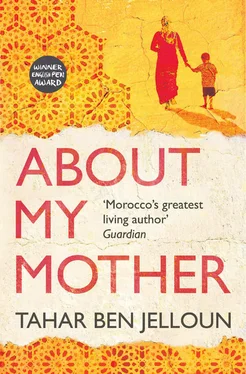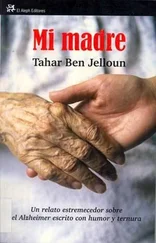It’s unacceptable. My brother went over and castigated her for her behaviour. She took umbrage and unplugged the phone again. She says she’s a prisoner of the situation. Mother won’t give her a moment’s peace and refuses to let her go and see her many children and grandchildren. My brother won’t give in to Keltum’s blackmail, even if he acknowledges she’s doing a job that neither his wife nor our sister is prepared to do. I can’t see any of my sisters-in-law sacrificing their time and comfort to carry my mother to the toilet, wash her, dry her and carry her back again in their arms, like a child.
Keltum’s become indispensable. She gives my mother her medication on time, feeds her, keeps her company, makes conversation, changes her clothes, even makes her laugh. Why would she do all that? It’s paid work, but there’s also a bond, a kind of friendship, a close companionship that’s lasted almost twenty years. Of course Keltum profits from the situation a bit, steals from time to time, sells off utensils and antique dishes, and siphons off some of the housekeeping money which she’s managed to persuade us to give her directly. Why would she be with my mother solely for sentimental reasons? My mother mixes everything up — job, affection, duty, etc. It’s not a factory. As they say: ‘We’re fond of each other. This is the way God willed it, fate has brought us together and only death will part us. We’ve made our pact, that’s the way it is. We are believers and God is our witness. Besides, we don’t know which of us will be the first to go!’
Tangier is bathed in brilliant sunshine. I offer to take my mother out for a drive. She hasn’t been out since the time we went to the Mirage. That was last summer. Keltum carries her to the car and we go off to see the sea. She doesn’t recognise the streets, she’s happy and she blesses me. I wanted her to see the people going by, to breathe in the smells of the city, watch a boat coming into port. I stop the car by the beach: the strong sun dazzles her. I realise she can’t see much, not only because of her eyesight but also because she’s so tiny. She’s hunched up in the seat and hasn’t the strength to sit up. She laughs it off, saying she’s slumped in the seat like a sack of potatoes. We leave the seafront and head towards the Vieille Montagne. There, deadly serious, she says to me: ‘Are we at Moulay Idriss’s mausoleum, or not yet?’
‘But Yemma, Moulay Idriss is in Fez, and we’re in Tangier. The patron saint of the city is Sidi Bouaraquia!’
‘No, I want to visit Moulay Idriss, I’ve owed him this visit such a long time. He’s the one interceding between me and our Prophet. I entrust him with my prayers, and he relays them to our holy Prophet. I want to tell him to watch over my son, who’s sitting his exams. You know, the youngest one’s going to college, but he has to pass his exams.’
‘But Yemma, Fez is a long way away, it’s a five-hour drive.’
‘Oh, all right, we’re not in Fez or Meknès. Then take me home. At least I know where I am there.’
When we got home, she found it hard to settle. That evening she was very tired, and she had a bad night. Keltum tells me the sea air is bad for her and gives her diarrhoea! She makes it clear that Mother’s personal hygiene is becoming more and more difficult — she refuses to wear pads and she removes the adhesive strips so they’re unusable. Keltum complains that there’s no washing machine. She says she’s had enough, she’s doing it all out of loyalty.
Roland’s mother has moved out of her apartment to a small hotel in a quiet street in Lausanne. She’s happy to stay there while her landlord carries out some building works. She’s developed a taste for hotel life. Everything’s easy, she has no worries and all the time in the world to read, watch her favourite TV programmes or phone her bridge partner friend. She discussed it with Roland, who encouraged her to extend her stay. He’d have preferred a luxury establishment, with a pool and a sauna. He’s always liked grand hotels, he’s even planning to end his life in the finest suite of a big luxury hotel. He’s not sure if it should be in Switzerland or Asia. The ultimate luxury.
Soon I’ll go and visit his mother, whom he often describes in language that shocks me. At ninety-two, she’s on good form: she’s independent, she reads, plays the piano and comments on her son’s life. Listening to me discussing a novel I’d written about one of Hassan II’s prisons on a television programme, she said to Roland: ‘What on earth did your friend do to end up in such a terrible prison for nearly twenty years, poor thing?’ ‘It’s not him, Mother, it’s someone else, he’s just writing about it!’
I have a fantasy that our two mothers might meet. Since mine’s unable to travel, she’d have Roland’s mother to stay with her in Tangier. I imagine the preparations for such an event. Repainting the house, re-covering the mattresses, redoing the bathroom … If Roland’s mother needed to go to the toilet, I daren’t think of her shock at finding the flush broken, despite its being repaired countless times, the bidet with neither tap working because Keltum broke them just to annoy Yemma, a chipped washbasin, a light bulb dangling from the ceiling because the wire, held in place with an old nail, has snapped — and the electrician who’s supposed to repair it is none other than one of Keltum’s many sons who has no clue how to do anything. Can you imagine what the bathroom of simple Moroccan folk would look like to Swiss eyes! No, I’d rather they meet on the patio of the El Minzah hotel. I’ll bring my mother in a wheelchair and tell her that an elderly lady would like to meet her, a lady a little older than her and in much better shape. She’ll say that we must invite her home, then she’ll change her mind and point out that Keltum’s cooking is heavy and not always good. I’ll translate the conversation between the two worlds and report it back to Roland, who’ll have a good laugh over it.
My mother will say to me: ‘This lady’s in much better health than I am. Are you sure of her age, because I don’t know when I was born. You worked it out so many times and decided on an age that isn’t right. But tell me, this lady’s Christian, isn’t she? She’s not a Muslim, I mean she’s not like us, so she’s an infidel, she’ll go to hell — isn’t that what the Qur’an says? I know that’s not very nice, what I just said, but we were always taught that Christians and unbelievers would go to hell, so your friend’s mother won’t go to paradise, I won’t see her there!’
‘But Yemma, you know very well that it’s people’s actions that determine whether their soul will end up in hell or in paradise. A Muslim can be punished for the bad things he’s done and go to hell, and a Christian who’s done good in his life will be rewarded and his soul accepted into paradise!’
‘Oh yes, you’re right! Your father was always making comments about non-Muslims behaving so much better than Muslims. He used to say: “That Jew deserves to be a Muslim, or that Christian is so good, he’s almost one of us!”’
She’ll ask me a dozen times who this lady is, why she’s come, what her son’s name is, what her husband does … She’ll ask me these questions until the lady fades into the limbo of her childhood memories.
I spoke to my mother on the phone this morning. She knew who I was immediately. The results of her tests aren’t good. Her blood sugar level has risen, despite the insulin and her diet. On top of that, she’s had a urinary infection. It was her doctor who told me, she was too embarrassed to tell me about it. She simply asked when I’d be coming to see her. She mentioned Eid al-Adha, the festival when the sheep is sacrificed, which had taken place more than a month earlier. ‘Son, Eid al-Adha has always been an ordeal as far as I’m concerned. I had to put up with your father’s nerves — he’d always wait till the last minute to buy a sheep, thinking he’d get a bargain, but often he’d be cheated. And I had no help. All the servants went home to their own families for the holiday, of course, and I’d be left alone with a slaughtered sheep in the yard or the kitchen and I had to prepare meals and do the housework. And then you were never happy: the first day the meat’s too fresh, it’s not edible. Oh, I remember very well, son, and don’t tell me I’m talking nonsense. Eid holidays are always disastrous. God forgive me but they wore me out, and of course people are only thinking about their bellies, when it’s a holiday that’s meant to be about the poor. Don’t forget to buy a sheep, even if you don’t like the meat. You have to sort that out. You only need to share it among the poor. Then, after the sheep, cakes had to be made, the family came over to celebrate with us and I didn’t have any good clothes. I’d be annoyed, and curse the wind and these traditions … Why don’t the Christians have such messy holidays? All that bloodshed, the guts and the slaughter, and that meat you have to eat, which they say isn’t good for the heart. I don’t want to sound like a bad Muslim, but one day someone will have to free us from these chores, this exhaustion. Every year, on the seventh day of the holiday, I get ill, I go to bed, I’m completely wiped out. I can’t bear it any more. Next year we’ll buy the meat at the butcher’s and then there won’t be any blood in my house …’
Читать дальше












